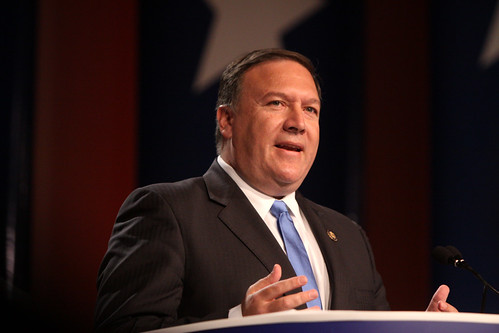Reprinted from shadowproof.com
Newly confirmed CIA director Mike Pompeo informed United States senators he would "aggressively seek to ensure we have the most effective programs for identifying insider threats." It was a pledge to pursue the same anti-leaks policies that discourage whistleblowing that President Barack Obama's administration pursued.
Since President Donald Trump has expressed his fervent support for torture, which is against the law, and a draft executive order has circulated suggesting the Trump administration will restore the CIA's rendition, detention, and interrogation program, the prospect of Pompeo intensifying efforts to clampdown on leaks is all the more concerning.
"Mishandling of classified information is a serious matter given the potential implications for U.S. national security," Pompeo declared. "Individuals determined to have mishandled classified information should be treated in accordance with relevant policies and the law, accounting for relevant factors including intent and harm to U.S. interests. Punishment may vary depending on the circumstances of each case."
Pompeo added, "Persons who are unable or unwilling to safeguard classified information successfully should not hold a security clearance. Using discretion, the Attorney General may seek prosecution of cases for mishandling of classified information. It is clearly the case that the accountability associated with mishandling of classified information should depend on a number of factors including the scope, duration, [and] intentionality of the mishandling, but all cases of mishandling of classified information must be addressed and actions must be taken to prevent their recurrence."
He called for "more aggressively implementing the Intelligence Community Information Technology Enterprise," which will "enable the electronic implementation of the need-to-know principle." He also mentioned the CIA's own "insider threat program."
Although he mentioned NSA whistleblower Edward Snowden ("the Snowden incident"), he said nothing about how he would ensure there were "proper channels" for whistleblowers to raise concerns about policies and programs they might find to be unethical or illegal. He said nothing about the chilling effect that insider threat programs can have on employees of good conscience, who may decide to stay silent in order to protect their livelihood from being destroyed.
None of the senators on the Senate intelligence committee bothered to ask him about whistleblowing either.
When George W. Bush was president, CIA officer John Kiriakou was the first member of the agency to publicly confirm that waterboarding was official U.S. policy. He believed the CIA was not authorized under the law to torture Abu Zubaydah. In response, Kiriakou was targeted by the Justice Department and pled guilty to confirming the name of an agent involved in the CIA's rendition, detention, and interrogation program to a reporter in violation of the Intelligence Identities Protection Act.
Kiriakou was sentenced to 30 months in prison in 2013. He was jailed at a federal correctional facility in Loretto, Pennsylvania, over one hundred miles away from his wife and five children. He had to mortgage his house, and his livelihood was utterly destroyed.
"There's literally nowhere that a CIA whistleblower can go other than the press, and that invites an Espionage Act charge," Kiriakou told Shadowproof. "If you want to blow the whistle, you have to blow the whistle to the Office Of Inspector General or the Office of General Counsel."
If the Inspector General is not read into a program or policy, then an employee may be guilty of violating the "need-to-know principle." And, "With these new rules, as they sound to me, the Inspector General's Office would be compelled to report the fact that an employee had gone to that office to report wrongdoing."
Kiriakou also found it naive of Pompeo to suggest the CIA would properly consider intent. When he was prosecuted, Judge Leonie Brinkema said intent was irrelevant. Either he leaked the information or not, and if he leaked the information, he deserved prosecution. The Justice Department took full advantage of that position.
Jeffrey Sterling, an African American CIA officer, was imprisoned at a federal correctional facility in Littleton, Colorado, about 900 miles away from his wife and family in St. Louis. He stood up to the CIA and brought a racial discrimination lawsuit against the agency in 2002. It was dismissed by the Supreme Court in 2005 after the government invoked the "state secrets privilege."
(Note: You can view every article as one long page if you sign up as an Advocate Member, or higher).






